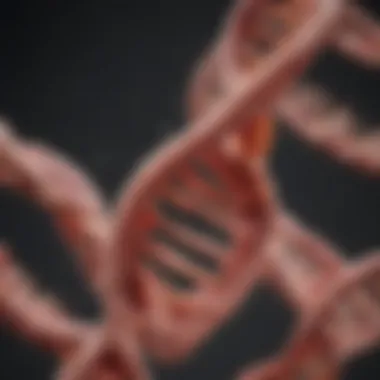Unmasking the Link Between Processed Meats and Cancer: Insights into Mechanisms


Strategies for Success
In understanding the critical link between processed meats and cancer development, it is imperative to establish clear goal-setting techniques. Researchers emphasize the importance of meticulously defining the objectives of dietary studies to unravel the impact of processed meats on cancer risk. Time management tips play a crucial role in conducting comprehensive research, ensuring that data collection and analysis are executed efficiently to reveal the mechanisms underlying this relationship. Incorporating productivity hacks can enhance the productivity of researchers, facilitating a deeper exploration of the scientific evidence that unveils how processed meats affect cellular pathways.
Leadership Psychology Insights
Exploring emotional intelligence in leadership within the context of processed meats and cancer development sheds light on how individuals perceive and react to dietary choices. Effective communication skills are essential in conveying the risks associated with processed meats, fostering a deeper understanding of the implications for human health. Team building strategies can be applied to collaborative research efforts, where experts from diverse fields unite to unravel the complexities of cancer development linked to processed meats.
Personal Growth and Development
Within the realm of personal growth and development, mindset shifts for success are crucial in comprehending the potential health risks posed by processed meats. Self-care practices play a pivotal role in maintaining the well-being of researchers immersed in the investigation of dietary factors contributing to cancer. Overcoming challenges and adversities encountered during research endeavors fuels resilience, enabling a more profound analysis of how processed meats influence cancer development.
Business Growth Strategies
Amidst discussions on the link between processed meats and cancer, it is imperative to consider marketing and branding strategies that influence consumer perceptions of processed meat products. Financial management tips are essential in allocating resources effectively for studies elucidating the mechanisms through which processed meats elevate cancer risk. Embracing innovation and entrepreneurship can drive novel approaches in researching the detrimental effects of processed meats on human health.
Case Studies and Real-Life Examples
Examining success stories of entrepreneurs within the food industry can provide valuable insights into the challenges and opportunities associated with processed meat consumption and its implications for cancer development. Drawing leadership lessons from industry experts offers a nuanced perspective on addressing dietary factors contributing to cancer risk. Analyzing business turnaround case studies related to the processed meat industry sheds light on possible interventions and regulatory measures to mitigate the health hazards associated with these products.
Prolusion
Within the realm of understanding cancer causation, one cannot overlook the pivotal role of processed meats. Investigating the intricate link between these preserved meats and cancer development sheds light on pressing health concerns. Delving into the nuances of how processed meats interact within the human body to potentially lead to malignancy unveils a complex web of molecular interactions and risk factors. As we embark on this informative journey, it becomes evident why the correlation between processed meats and cancer demAands meticulous scrutiny.
Definition of Processed Meats
Processed meats refer to meats that have undergone various preservation methods, such as smoking, curing, or salting, to extend their shelf life. Common examples include bacon, sausages, ham, and deli meats. These meats often contain additives for flavor enhancement and preservation, making them convenient but posing potential health risks due to their processed nature.
Scope of the Issue
The scope of the issue surrounding the consumption of processed meats spans far and wide, influencing public health on a global scale. With rising concerns about the increasing consumption of these products, understanding the implications becomes paramount. From individual health consequences to broader societal impacts, delving into the scope elucidates the multifaceted challenges posed by processed meats in modern diets.
Purpose of the Article


The purpose of this article lies in unraveling the enigmatic relationship between processed meats and cancer risk. By synthesizing scientific findings and empirical evidence, the article aims to provide readers with a comprehensive understanding of how processed meats contribute to the development of cancer. Shedding light on the underlying mechanisms and intricate pathways involved, the ultimate goal is to equip readers with knowledge to make informed decisions regarding their dietary choices, thereby empowering them to proactively safeguard their health and well-being.
Understanding Cancer
Cancer, a complex and multifaceted disease, holds a pivotal role in elucidating the correlation between processed meats and cancer development. Understanding the mechanisms behind cancer formation is crucial in unraveling the intricate link with processed meats. By dissecting the intricacies of cancer biology, we can comprehend how processed meats influence carcinogenesis at a molecular level. This section serves as a cornerstone for decoding the underlying mechanisms that drive the development of cancer in the context of processed meat consumption.
Cancer Development Process
Cancer development is a convoluted process characterized by uncontrolled cell growth and proliferation. The initiation and progression of cancer involve a series of genetic mutations that disrupt normal cellular functions, leading to tumor formation. Understanding the intricate cascade of events that transform healthy cells into malignant tumors is paramount in grasping the fundamental essence of carcinogenesis. By exploring the stages of tumor initiation, promotion, and metastasis, we can appreciate the complexity and heterogeneity of cancer development.
Risk Factors for Cancer
Diverse factors contribute to the onset and progression of cancer, ranging from genetic predisposition to environmental influences. Recognizing the significance of risk factors sheds light on the modifiable and non-modifiable elements that impact an individual's susceptibility to developing cancer. Lifestyle choices, such as diet and tobacco use, play a significant role in augmenting cancer risk. Moreover, exposure to carcinogenic substances, including those found in processed meats, poses a considerable threat to cellular integrity and genomic stability. By identifying and mitigating these risk factors, we can attenuate the likelihood of cancer development and enhance overall health outcomes.
Mechanisms of Carcinogenicity
The section on Mechanisms of Carcinogenicity plays a pivotal role in unraveling the intricate dynamics between processed meats and cancer development. By delving into the specific mechanisms underlying carcinogenicity, we can grasp the fundamental processes that drive the association between these foods and cancer risk. Understanding the Mechanisms of Carcinogenicity is crucial for shedding light on how substances in processed meats trigger or promote cancer growth. This section delves deep into the molecular pathways and interactions that result in the harmful effects observed at a cellular level.
Nitrites and Nitrosamines
Nitrites and Nitrosamines are compounds found in various processed meats and play a significant role in the carcinogenic potential of these products. Nitrites are commonly used as preservatives in processed meats to extend shelf life and enhance flavor. When consumed, nitrites can react with amines in the stomach to form nitrosamines, which are known carcinogens. This subsection explores the mechanisms by which nitrites and nitrosamines contribute to cancer development, highlighting the importance of regulating their use in food processing to reduce cancer risk.
Heme Iron
Heme Iron is another crucial element in processed meats that is implicated in cancer development. Heme iron is a type of iron that is more readily absorbed by the body and is abundant in red and processed meats. When heme iron is digested, it can produce carcinogenic N-nitroso compounds in the gut, potentially leading to DNA damage and cell mutations. Understanding the role of heme iron in carcinogenesis provides valuable insights into how certain components of processed meats can initiate or promote cancer growth.
Additives and Preservatives
Within processed meats, Additives and Preservatives are commonly used to enhance flavor, texture, and shelf life. However, some of these additives may have carcinogenic properties or interact with other compounds in the meat to form harmful substances. This subsection explores the various additives and preservatives used in processed meats, their potential impact on health, and the importance of evaluating the safety of these food additives to mitigate cancer risk factors.
Scientific Evidence
In dissecting the intricate relationship between processed meats and cancer, the cornerstone lies in scientific evidence. This article maneuvers through a labyrinth of research to unravel the profound impact of processed meats on human health. Scientific evidence serves as the bedrock upon which our understanding is built, grounding the discourse in empirical data and peer-reviewed studies. It offers not just mere speculation but concrete findings that illuminate the dark alleys of this pressing issue.


The significance of focusing on scientific evidence within this article cannot be overstated. It provides a factual basis for the claims made, lending credibility and authority to our discussions. By delving into scientific literature, we unearth hidden truths about the deleterious effects of processed meats, enriching our awareness and empowering us to make informed decisions regarding our dietary choices. Moreover, scientific evidence acts as a guiding light, steering us away from pseudoscience and unsubstantiated beliefs, fostering a culture of critical thinking and evidence-based reasoning.
Scientific evidence acts as a guiding light, steering us away from pseudoscience and unsubstantiated beliefs, fostering a culture of critical thinking and evidence-based reasoning.
Epidemiological Studies
Epidemiological studies play a pivotal role in unveiling the nexus between processed meats and cancer. Through large-scale investigations and data analysis, these studies offer a panoramic view of the prevalence and patterns of cancer associated with processed meat consumption. By sifting through vast cohorts of individuals, epidemiologists can pinpoint correlations, identify trends, and discern causation where mere speculation once reigned.
Wading through the depths of epidemiological studies allows us to discern the overarching impact of processed meats on public health. These studies not only shed light on the immediate repercussions but also unveil latent risks that may elude the untrained eye. As we navigate the sea of statistical analyses and risk assessments, a clear picture emerges, underscoring the urgency of addressing the looming crisis posed by processed meats across diverse populations.
Experimental Studies
In the realm of cancer research, experimental studies stand as pillars of scientific inquiry. By subjecting biological systems to controlled experiments, researchers can unravel the intricate mechanisms through which processed meats induce carcinogenic processes. These studies serve as intricate tapestries, weaving together molecular pathways, cellular responses, and physiological outcomes to paint a comprehensive portrait of the havoc wreaked by processed meats at the cellular level.
Venturing into the realm of experimental studies unlocks a treasure trove of knowledge, offering glimpses into the inner workings of malignancy instigated by processed meats. From elucidating the role of specific compounds to delineating specific genetic aberrations triggered by these culinary culprits, experimental studies provide the missing pieces of the puzzle essential for understanding and combating the cancer epidemic fueled by processed meats.
Impact on Cellular Pathways
Processed meats have a significant impact on cellular pathways, playing a critical role in the development of cancer. Understanding this impact is pivotal in elucidating the mechanisms through which these meats contribute to oncogenesis. Cellular pathways refer to the intricate network of signals and interactions within cells that regulate various biological processes, including growth, proliferation, and cell death. In the context of processed meats and cancer, alterations in cellular pathways can trigger uncontrolled cell growth and division, leading to tumor formation. By delving into the effects of processed meats on specific cellular pathways, such as the PI3K/Akt/mTOR pathway implicated in cancer progression, we can grasp the molecular changes that underlie carcinogenesis.
- The relevance of this topic lies in its direct correlation to cancer development, offering insights into the molecular mechanisms driving cell transformation.
Understanding how processed meats disrupt cellular pathways is crucial for designing targeted therapies to mitigate their carcinogenic effects.
Inflammation and Oxidative Stress
Inflammation and oxidative stress are key contributors to the link between processed meats and cancer. Processed meats, rich in saturated fats and pro-inflammatory compounds, can trigger chronic inflammation in the body. Inflammation serves as a cornerstone in cancer development, creating a microenvironment favorable for tumor growth and progression. Additionally, oxidative stress induced by the consumption of processed meats leads to DNA damage, further increasing the risk of mutations and cancer initiation.
- The intricate interplay between inflammation and oxidative stress underscores the multifaceted impact of processed meats on cellular health.
DNA Damage and Mutagenesis
Processed meats expose cells to genotoxic compounds that can induce DNA damage and mutagenesis, laying the groundwork for cancer initiation. DNA damage refers to changes in the DNA structure caused by external agents like nitrites and nitrosamines present in processed meats. These alterations can disrupt normal cellular functions and promote aberrant cell growth, setting the stage for tumor formation. Mutagenesis, the process of genetic mutation, can be accelerated by the mutagenic properties of certain components in processed meats, amplifying the risk of malignant transformation.


- Exploring the link between DNA damage, mutagenesis, and processed meat consumption sheds light on the molecular events driving carcinogenesis.
Apoptosis Inhibition
One of the intriguing mechanisms by which processed meats promote cancer development is through apoptosis inhibition. Apoptosis, or programmed cell death, is a vital process that eliminates damaged or abnormal cells to maintain tissue homeostasis. However, additives and preservatives present in processed meats can interfere with apoptotic signaling pathways, leading to the survival of potentially harmful cells. This inhibition of apoptosis enables precancerous or mutated cells to evade death signals, fostering their uncontrolled proliferation and contributing to tumor formation.
- Understanding how processed meats hinder apoptosis provides valuable insights into strategies for restoring programmed cell death and preventing cancer progression.
Preventive Strategies
In the realm of processed meats and their potential link to cancer development, preventive strategies stand as beacons of hope amidst health concerns. With a robust focus on averting the harmful repercussions of processed meats, implementing preventive strategies becomes paramount. These strategies serve as a shield, guarding individuals from the detrimental effects associated with the consumption of these products. By delving into preventive strategies, we aim to empower individuals with knowledge to make informed choices regarding their dietary habits.
Dietary Modifications
Dietary modifications constitute a fundamental aspect of the preventive approach against cancer risks posed by processed meats. The significance of dietary modifications lies in their ability to redefine individuals' food choices, steering them towards healthier alternatives. Embracing a diet rich in fruits, vegetables, whole grains, and lean proteins while reducing the intake of processed meats can significantly lower the chances of developing cancer. Moreover, incorporating foods abundant in antioxidants and essential nutrients can fortify the body's defense mechanisms, mitigating the potential harm induced by processed meats.
Cooking Practices
The intricacies of cooking practices intertwine with the narrative of preventing the adverse effects of processed meats on human health. Employing healthier cooking methods, such as grilling, baking, or steaming, can mitigate the formation of harmful compounds that arise during the processing and cooking of meats. By minimizing the exposure to high temperatures and direct flames, individuals can safeguard themselves against the carcinogenic substances that may infiltrate meats during traditional cooking practices. Additionally, marinating meats in herbs, spices, and acidic solutions before cooking can act as a barrier against the formation of cancer-causing agents.
Public Health Policies
At the societal level, public health policies play a pivotal role in shaping the landscape of food regulations and consumer awareness concerning processed meats and their association with cancer. Implementing stringent regulations on the production, marketing, and labeling of processed meats can enhance transparency and enable consumers to make informed choices. Furthermore, advocating for comprehensive public health campaigns that elucidate the risks associated with excessive processed meat consumption can drive behavioral changes at a broader scale, fostering a healthier community. By intertwining legislative actions with educational endeavors, public health policies become instrumental in steering societies towards healthier dietary practices and reducing the burden of cancer incidences.
End
Processed meats are undeniably linked to cancer development, shining a spotlight on the pressing need for awareness and action in our dietary choices. The culmination of research on the mechanisms underlying this connection underscores the gravity of the situation. Understanding that nitrites and nitrosamines, heme iron, and various additives and preservatives play pivotal roles in carcinogenicity helps us grasp the complexity of this issue.
In dissecting the impact on cellular pathways, it becomes evident how processes like inflammation, oxidative stress, DNA damage, mutagenesis, and apoptosis inhibition fuel the progression of cancer in individuals who regularly consume processed meats. These findings solidify the necessity of adopting preventive strategies to mitigate cancer risk.
The essence of this conclusion delves into the urgent call for dietary modifications, safer cooking practices, and cohesive public health policies. Embracing these changes can significantly reduce the potential harm caused by processed meats and pave the way for a healthier future for all.
Key Takeaways
- Processed meats' association with cancer is founded on robust scientific evidence.
- Nitrites, nitrosamines, heme iron, and additives are key culprits in the carcinogenicity of processed meats.
- Cellular pathways such as inflammation, oxidative stress, and DNA damage are intricately linked to cancer development.
- Preventive measures like dietary adjustments and safer cooking methods are crucial in lowering cancer risk associated with processed meats.
Future Research Directions
As we move forward, future investigations should delve deeper into the specific mechanisms through which processed meats induce DNA damage and inhibit apoptosis. Exploring innovative approaches to counteract the adverse effects of heme iron and additives in processed meats could pave the way for novel preventive strategies. Additionally, longitudinal studies focusing on the long-term impacts of dietary modifications and public health interventions will provide invaluable insights into reducing the burden of processed meat-related cancers on a population level.



